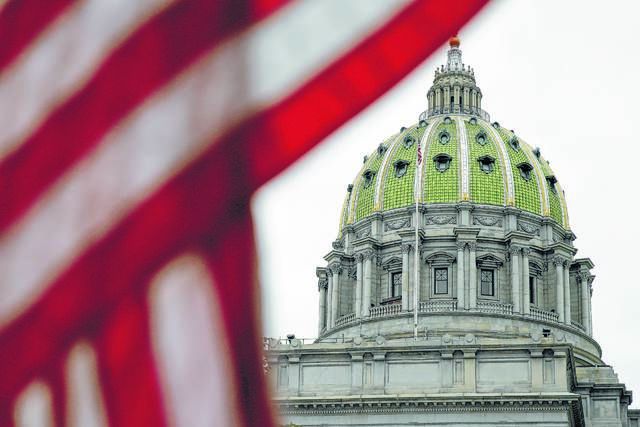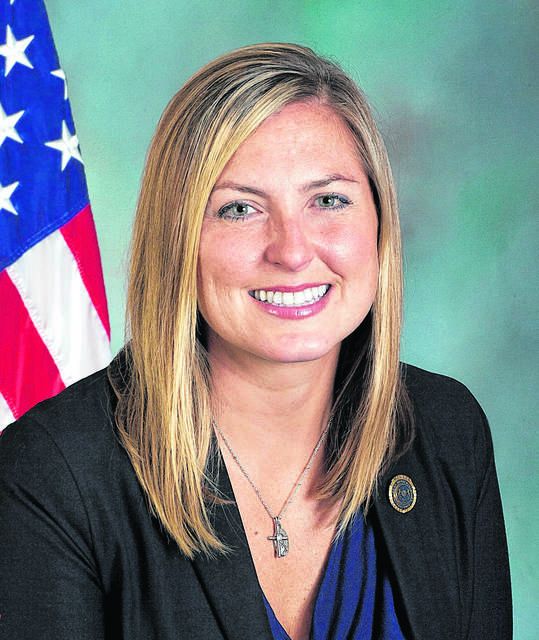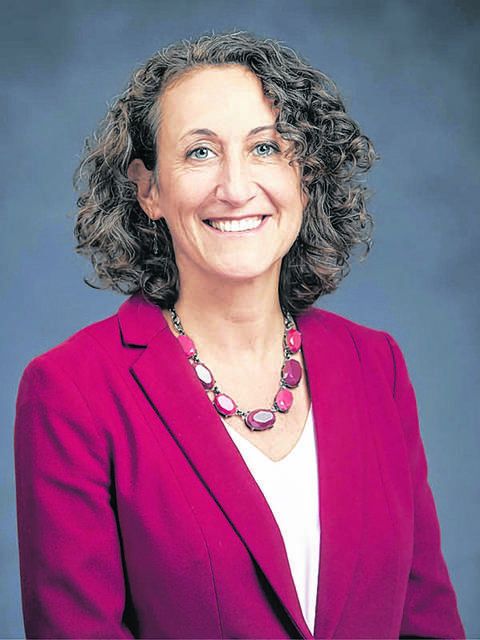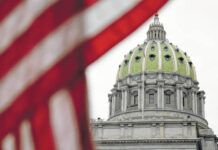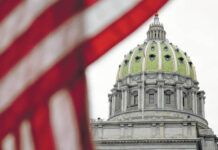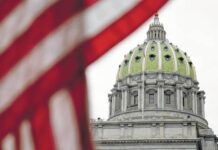Click here to subscribe today or Login.
As Pennsylvania’s economy is slowly recovering and additional economic solutions are being sought, the House and Senate Majority Policy committees, along with Rep. Aaron Kaufer, R-Kingston, held a joint hearing and met with area industrial and union leaders to discuss the economic impact and benefits of the Local Resource Manufacturing Tax Credit.
“It is not just about investing in dry natural gas – it is about creating and expanding family-sustaining employment opportunities and opening the door for fresh economic possibilities in Pennsylvania,” said Kaufer, sponsor of Act 66 of 2020. “This tax credit also allows the Commonwealth to once again operate as a manufacturing hub for industrial exports. I want to thank Rep. Causer, his committee and our local industry leaders for coming together today to share future goals and intentions following the enactment of this beneficial tax credit.”
“Incentives for manufacturers to build facilities that create jobs are always important, but they are especially critical in the current economy,” said Rep. Martin Causer, R-Cameron/McKean/Potter, chairman of the House Majority Policy Committee. “Today’s hearing allowed committee members to hear from industry leaders who plan to use Pennsylvania energy resources to create jobs and manufacture products here in the Commonwealth.”
“The Local Resource Manufacturing Tax Credit was passed after months of negotiations between Republicans and Democrats, organized labor and business, the House of Representatives, the Senate and the governor,” said Senate Majority Policy Chairman David G. Argall, R-Schuylkill/Berks. “I am excited for the opportunities that this tax credit will bring to the region. We are going to see heavy investments in Pennsylvania energy while providing thousands of good-paying jobs to our residents.”
Act 66 of 2020 established the Local Resource Manufacturing Tax Credit to attract private investment in the construction and operation of Pennsylvania manufacturing facilities that use dry natural gas to produce fertilizer and other petrochemical products. Plants that use natural gas synthesis to produce fertilizers and other products are designed to capture the majority of greenhouse gas emissions in their manufacturing process which helps dramatically reduce the facility’s carbon footprint.
For more information about this outreach, or any other state-related issue, contact Kaufer’s district office in Luzerne located at 161 Main St., or by calling 570-283-1001. Information can also be found online at RepKaufer.com or Facebook.com/RepKaufer.
State reminds older adults how to vote safely in November election
The Pennsylvania Department of Aging this week encouraged older adults to be informed about their options for voting in the Nov. 3 General Election if they are concerned about being able to vote safely amid COVID-19.
“The Department of Aging urges older Pennsylvanians to keep their health and well-being in mind however they choose to cast their ballot in November,” said Sec. of Aging Robert Torres. “The older adult population consistently votes more often than any other age group, and the turnout for the upcoming election may likely be no different. Therefore, it is important that they are able to vote without putting themselves at risk.”
AARP Pennsylvania State Director Bill Johnston-Walsh added, “The coronavirus may have put large parts of our lives on hold, but there’s one event it won’t delay — the 2020 election. At AARP, we’re fighting to protect 50-plus voters and ensure they can vote safely from home or in-person.”
Torres noted that if older adults are opting to vote by mail-in ballot, they should apply for one as soon as possible at votesPA.com.
Here are some guidelines for voting by mail-in ballot:
• Read the ballot and instructions carefully.
• Pay attention to where you place your pen. Don’t rest it on the ballot as it could potentially make an unintended mark somewhere and the tabulator will not read it correctly, or the pen could accidentally mark a candidate for whom you didn’t want to vote.
• Return the ballot by mail or in person to your county Board of Elections or officially designated drop-off site as soon as possible.
• Be sure to place your ballot in the inner secrecy envelope and then put the secrecy envelope into the outer return envelope, which you must sign. County election officials will not count your ballot if it is returned without both envelopes. Be sure to sign the declaration on the outer envelope so the ballot will be counted.
In addition, Pennsylvania voters now have the option of voting in person at their county election office before election day. Just go to your county election office, request a ballot, fill it out and submit it — all in the same visit.
For older Pennsylvanians who are looking to vote at their polling place on Election Day, the polls will be open 7 a.m. to 8 p.m. Wear a mask, bring your own pen and follow social distancing guidelines.
The Pennsylvania Department of State is supplying counties with masks, face shields, hand sanitizer, floor marking tape and other supplies for polling places so Pennsylvanians can safely exercise their right to vote during this COVID-19 emergency.
Older adults can check the status of their voter registration by visiting votespa.com, or by calling 877-VOTESPA (868-3772).
Pennsylvania law now allows residents to register to vote up to 15 days before an Election Day. The deadline to register to vote in the November election is Oct. 19. Absentee and mail-in ballots must be returned by 8 p.m. on election day.
Rep Toohil’s bill
advances in Senate
Legislation that would protect living organ donors in Pennsylvania, sponsored by Rep. Tarah Toohil, R-Butler Township, was unanimously approved by the Senate Health and Human Services Committee today and now moves to the full Senate for consideration.
“My bill would provide living organ donors with more certainty and help to encourage additional Pennsylvanians to give the gift of life,” Toohil said. “I am grateful to the committee and its chair, Sen. Michele Brooks, for their unanimous support. Our hope is to get the measure enacted before the current legislative session ends in November.”
House Bill 924, or the Living Donor Protection Act, would prohibit a life, accident or health insurance company from discriminating against an organ or tissue donor. It would also ensure family and medical leave be provided for an eligible employee for the preparation and recovery necessary for surgery related to living organ or tissue donation.
In addition, the proposal would require the state Department of Health to develop informational materials relating to living donors and the benefits of live donation of organs and tissue.
Toohil donated a kidney to her mother in 2003 and has been a strong advocate for organ donation during her House tenure.
PA high schools compete in
voter registration challenge
In celebration of National Voter Registration Day, Secretary of State Kathy Boockvar reminded Pennsylvanians that the fourth annual Governor’s Civic Engagement Award (GCEA) Program for high schools is underway.
The program promotes student-led voter registration efforts and recognizes schools that register at least 65 percent of their eligible students.
“The Pennsylvania Department of State is proud to be part of this innovative, nonpartisan program, which teaches young people civics and cultivates the lifelong habit of voting. By inspiring their peers to register, vote, and serve as poll workers, they become invested in our democracy,” Secretary Boockvar said. “A presidential election year presents an ideal teaching opportunity. I urge educators to enroll their schools in the program as soon as possible so they can get the voter registration toolkit early and receive valuable updates throughout the school year.”
Schools that register at least 85 percent of their eligible students earn a Gold Level Award, while schools that register 65 percent or more of their eligible students earn a Silver Level Award. To be eligible to register to vote, a student must be a U.S. citizen and 18 years of age, or turn 18 on or before the date of the next primary, special, municipal or general election.
Participating schools will have two voter registration opportunities this school year – for the November general election and the 2021 primary next May. The deadline to apply for a GCEA for the 2020-21 school year is May 5, 2021. Recognition events will be held in May to honor the winning schools and students.
The GCEA program has grown in popularity. In its inaugural year, 16 high schools won awards. The second year, 23 schools won awards and eight student poll workers earned individual recognition. Last year, 43 schools won awards and 13 student poll workers were recognized.
Reach Bill O’Boyle at 570-991-6118 or on Twitter @TLBillOBoyle.





